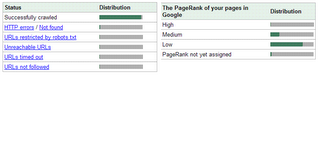 I drove to the SES Miami conference today and found an underpopulated exhibit hall and a booth full of google employees ready to help by answering questions.
I drove to the SES Miami conference today and found an underpopulated exhibit hall and a booth full of google employees ready to help by answering questions.I cannot begin to describe my excitement.
A patient and knowledgeable Vanessa Fox fielded by questions which were too-often punctuated by, "Sorry, can you back up and explain...." She did backup and try again. thanks thank thanks.
Heres what I retained. I only wish I had a bigger brain, more time to prepare, and better note-taking....
1. My site is basically OK. My two tiered site map is fine, there's no clear advantage for me building & maintaining a site map, and there are no obvious red flags to worry about. But.....
2. Stop wasting time building internal links. Google doesn't count or weigh them. Internal links only count in so far as the spider uses them to find pages. It's only external links that give pages "page rank". (I asked "Is this "party line" or is it true?" She assured me it was true-true. Then she smiled at me. I believed her.)
3. Stop wasting time obsessing over the page rank bar. Its even more useless than i thought. And while google iste maps will tell us the one page that is doing the best on our site, Vanessa will "not ever ever ever tell" what the relative page rank of any other internal page is. She said that my page crawl stats show a healthy distribution of page rank and that there are no real problems with timeouts (despite what the reportcard web site was telling me) or code errors.
4. Learn to use redirects. This has been a area of ignorance for me. Learn about 200, 404, 301s and how to use my excess domains thru redirects. Also, having no robot.txt file, I've been sending out my handling of a "page not found" which is a 200 and serving up a default page which people like but which doesn't much help the spider.
5 Build a robot.txt file which is easy peasy. Now its done!
6. Put no follow on my links to secure pages (ie https:) to save time for the spider.
7. Do not repeat text. If possible, have my new articles start on my site and then get republished so its clear that i'm the source. I've been doing this backwards by having a blog which I used for rough drafts of pages and then move to my site when they are well-written.
8 For keyphrases which the google crawl query stats list as a high volume search but which are not in the high volume clicks table, revisit how my listing is appearing on the google search to make it more attractive.
9. The page analysis shows some terms as not appearing often in my site but which I consider to be crucial. Use them more!
Read read read - http://www.google.com/support/webmasters/
http://gsitecrawler.com/articles/error-404-200.asp
http://google.com/support/webmasters/bin/answer.py?answer=40132&topic=8845
http://google.com/support/webmasters/bin/topic.py?topic=8843
http://www.mattcutts.com/blog/guest-post-vanessa-fox-on-organic-site-review-session/
http://groups.google.com/group/google-sitemaps
thanks thanks thanks thanks to vanessa fox
Are you coming back next year?
Glad I could help!
ReplyDeleteI would add to your note about internal links. It's not that a site doesn't need them at all. You want to have a good internal link structure so Googlebot has an easier time crawling your site. But there's no PageRank-type benefit to having a bunch of internal links to a particular page.
Vanessa Fox: Anyone know where she ended up?
ReplyDelete